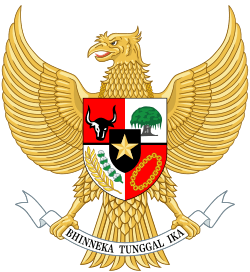Bone state
Bone (also Boni, or Bone Saoraja) was a sultanate in the south-west peninsula of Sulawesi (formerly Celebes), now part of modern-day Indonesia. Covering an area of 2,600 square kilometres (1,000 sq mi), Bone's chief town Boni, lay 130 kilometres (81 mi) northeast of the city of Makassar, home to the Bugis people.

Bone was an adat-based Bugis kingdom whose origins can be traced back to the early 15th century. Its chronicle (as yet unpublished) provides detailed information on its rulers, starting from La Umasa, who ruled in the early 15th century, through to La Tenrtatta, who died in 1699. Under La Umasa and his nephew La Saliu (Kerrépelua) who succeeded him, Bone expanded from a handful of settlements around the modern capital Watampone to a small kingdom roughly one-third the size of kabupaten Bone. In the early 16th century the kingdom expanded northwards, fighting with Luwu for control of the mouth of the River Cenrana a major east coast trade exit. In 1582 Bone entered an alliance with the Wajo and Soppeng kingdoms for mutual defence against the rising power of Gowa-Tallo. This alliance became known as LaMumpatue Ri Timurung or The burying of the stones at Timurung.[1]
In 1605, during the reign of the tenth king of Bone Latenri Tuppu Matinro Ri Sidenreng, Islam entered Bone and caused a change in local culture, including a renaming of various aspects of the regal system.[2] Bone State later enjoyed a period of prosperity in the middle of the 17th century.[1]
Bone became the most powerful state of South Sulawesi under Arung (ruler of) Palakka, La Tenritatta (1634 or 1635 – 1696) who sided with the Dutch admiral Cornelis Speelman against the Makasar kingdom of Goa-Tallo, which led to the defeat and capture of Makassar in 1669. From this year until 1814 when the British temporarily gained power of the region, Bone was by treaty and in practice the overlord of South Sulawesi, with the exception of Dutch-controlled areas on the west and south coast, including the important port-city of Makassar. When the Dutch returned to Makassar in 1816 the Dutch attempted to reduce Bone's status from equal to vassal, a move strongly resisted by Bone's rulers.
In May 1950, the people held demonstrations in Watampone against the royalty and Bone's membership in the State of East Indonesia. This caused the sultan to join Indonesia.[2]
See also
References
- For the wars in Boni, see Perelaer, De Bonische Expedition, 1859 (Leiden, 1872) (in Dutch); and Meyers, in the Militaire Spectator (1880).
- Chisholm, Hugh, ed. (1911). . Encyclopædia Britannica. 4 (11th ed.). Cambridge University Press. pp. 205–206.


